A typical Turkish breakfast, as presented in hotels, has hard boiled eggs, a couple of kinds of cheese (one that is much like Monterey Jack, and beyaz peynir, which is Turkish for "white cheese": a slightly sour cheese with the consistency of feta), thick strained yogurt, sliced bread, a selection of preserves (often including rose flower jelly), a couple of kinds of olives, tomatoes, and cucumbers. Some places had dry cereal and UHT milk available, but since the cereal appeared to be something along the lines of Cocoa Puffs, I gave it a pass.
Some days there would be börek -- an example of börek that more Americans would have experienced is spanakopita (which in Turkish is ıspanak börek), though usually in the morning it would be sigara börek, rolled into cigar shapes with just white cheese and maybe a few spices inside. Fancier hotels might have a selection of pastries and cakes.
I'm perfectly happy to eat a hard-boiled egg every day, so I did. That, plus a handful of olives, some tomatoes and cucumbers, and a scoop of yogurt with honey on top make a pretty good breakfast to start your day. There was always hot çay (very dark tea) in a dispenser, usually one that also dispensed hot water so you could lighten the çay as much as you liked. Sometimes there was a Nescafe machine so you could get something removely like coffee, but I have it on good authority that the stuff is terrible. Often there was a dispenser of something rather like a less-sweet Tang, which was acceptable. I'm not really a hot beverages kind of person, so most mornings I had the Tang stuff or water.
The rhythm of the day revolves around snacking. Breakfast, do some stuff (for us this was a one and a half hour trip across Istanbul), then a cup of çay. Lunch, which would usually be something fairly simple like döner (meat on a spit cooked with a gas flame, then sliced off either to make a plated meal or to put in a pide, which is the Turkish word for pita) or a piece of börek. Then midafternoon another çay. Then dinner (more elaborate), followed by more çay.
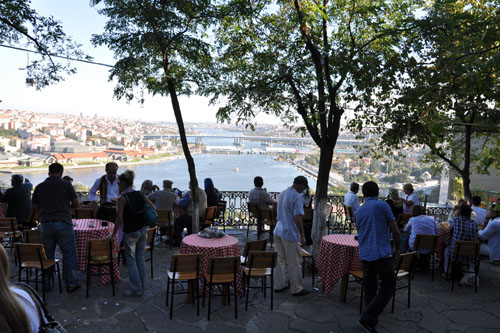
One afternoon my cousin Erdinç picked us up and drove us to some more inaccessible sights. We ended up here, at Pierre Loti, a lovely cafe that looks out over the city. It's perfectly natural to go to a cafe and just order a çay, which costs usually 1.5TL (about a dollar) and then sit at the table for an hour or more. The waiter doesn't glare at you or try to encourage you to move on.
After that cafe, we went to Erdinç's house, where his amazing wife had made a delicious dinner for us:
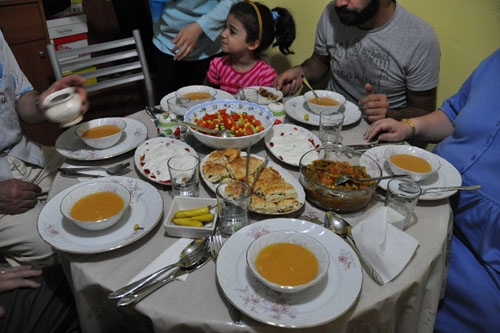
This is a pretty typical fancy but not elaborate dinner for guests. We had a shepherd's salad (chopped cucumber, chopped tomato, chopped onion, dressed with oil and vinegar and maybe parsley). The soup is yoğurt-based, it is made from a dried cake prepared in advance by mixing yogurt plus spices and drying it; you can then powder the cake and reconstitute it with hot water for a quick soup. There's also homemade spinach börek, chilled canned red peppers in yoğurt, and a simple stew, plus we had whole wheat and white bread. (Noel got a special little dish of peppers that you can see in the front; all my relatives were amazed by his ability to eat very spicy foods.) We had sour cherry juice to drink (my cousin is both a devout muslim and a vegetarian, so no alcohol and no meat). For dessert we'd stopped and bought some baklava and a very sweet melon on the way to his house, plus Erdinç's wife made little cooked rice pudding cakes soaked in sugar water.
A typical restaurant meal would be a little less elaborate. We'd usually start with a shepherd's salad (lettuce or greens-based salads were not usually available outside of tourist areas), plus various breads. Then a dinner plate with either an entire small fish (çupra, or sea bream, was a pretty nice choice) or köfte (lamb meatballs) or cooked meat (and meat pretty much always meant lamb cooked within an inch of being charcoal), plus a little dab of pilaf, plus a vegetable or two. I pretty much grew up on pilaf, and it's what I always think of as default starch with dinner (well, rice of some sort). I was surprised how much bread figured in, until my mother explained that when my father was young, there had been a flour shortage, so bread was only for holidays. In the 40-some years since he left, that's obviously changed, and now people throw bread all over the table like it's going out of style.
The other thing is, as in the cafes, we were never hustled out of our table in a restaurant. When you arrived for dinner, they seated you and you owned that table for as long as you wanted to stay. In some cases this could be hours. Some people came and went while we ate our meals, and sometimes we arrived after a particular party and left well before them. Whether this was good or bad for business I don't know, but September is supposed to be the big tourist month in Istanbul and we were always able to find a table; there are a lot of restaurants.
On a practical note, in Turkey restaurants add a 10% service charge to the bill, and then you can add more for better service. We always did, though several people told me Turks often do not.
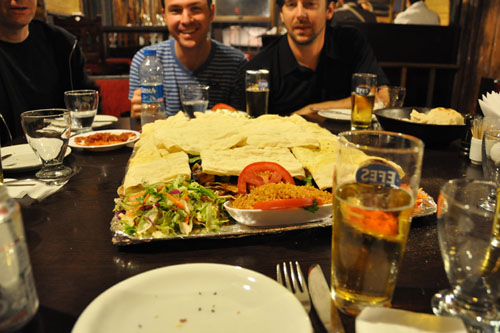
On the last night of our Turkish classes, those of us who were physically able (one member of the class was disabled enough to not be able to navigate the streets in Istanbul) went to a restaurant in Taksim. We ordered the mixed grill platter for the table to share. This is the platter arriving at the table: a large tray piled with assorted types of grilled meats and meatballs, with vegetable salads in the corners, bulgar and pilaf on the ends, and flatbreads laid over the top.
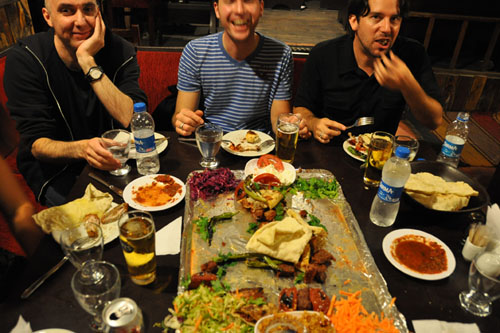
We made a valiant effort to finish the platter, but in the end there was still quite a bit of food left.
You can also see, in the photos, that despite the fact that the vast majority of people in Turkey are muslim, it is still a secular country in many ways, one of which is the ready availability of beer. The local brand is Efes (which you may note is the Turkish name for Ephesus). It's not the greatest beer, just a light lager that borders on having enough flavour, but it's not bad. We also sampled Turkish wines while visiting my father's college friend, who is a vintner, and they were not half bad. The typical Turkish hard liquor is rakı, which is like pretty much every other anise-based liquor I've ever had. It's not bad diluted heavily with water, but not a first choice if you want to taste anything but anise.
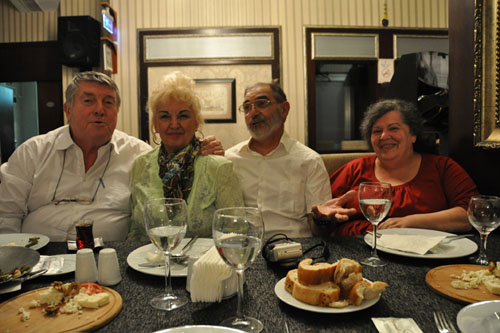
Here are my parents plus my dad's friend from school, Aydin, and his wife. We had an amazing meal in this hotel in Aksaray (the city, not the neighborhood in Istanbul), and at this point we were on the cheese course. Turkey has a wide variety of very interesting cheeses.
I'd be remiss if I did not at some point mention street food. But honestly, we didn't eat very much street food. Throughout Istanbul you'll find signs for balık ekmek -- fish bread -- which is a grilled fish sandwich.
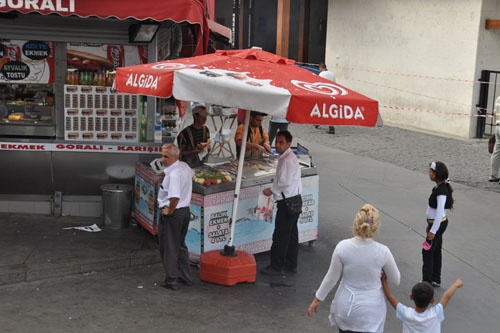
You pretty much won't find fish at any real distance from the water, but Istanbul, being right on the water, is crazy with fish. It's not always cheap -- the fish we got in restaurants near our hotel was between 15TL and 20TL a plate, and went upwards if you wanted something fancier -- but street food is usually smaller portions and less fancy, and thus cheaper.
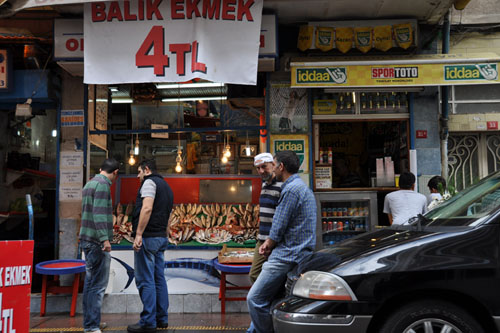
The other thing you'd see around Istanbul, more in areas where there were fewer tourist, was kumpir. Which is basically mixed pickled things on a baked potato.
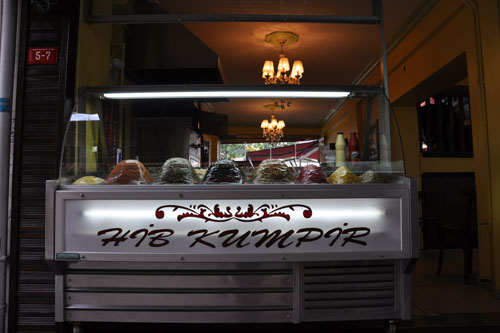
I never expected the pickles. Just about every Turkish sandwich has pickles in it, and you can buy pickles everywhere, and at restaurants you get pickles as if they were refills of water (which you do not get).
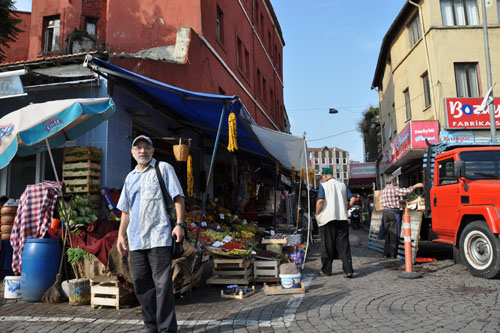
And the best kind of street food: little corner markets with fresh fruits and vegetables. This is my dad standing by what I jokingly referred to as the ancestral greengrocer's stand: his grandfather had a fruit stand on this corner when my dad was a kid. Maybe that is why every time we passed a fruit seller, he had to stop and buy fresh figs (in Turkey they are enormous, easily four times the size of a fig in California) and other kinds of fresh fruit. And the fruit is terrific. Turkey doesn't have the same homogenized produce system as we have in the US, and fall is a great time for fresh fruit in a Mediterranean climate, so stands were piled with interesting apples, sweet grapes (almost all with seeds), fresh figs, tomatoes, and so on. Dates were just starting to come in, as well, so you could get fresh dates and dates that had been allowed to shrivel and sweeten but hadn't yet gotten dry. You can get those in the US, but only with careful searching and luck (being in an area where date palms grow, for example).
The next time we go to Turkey we want to rent an apartment (we tried to do it this time but had a language barrier) and do more of our own cooking and shopping. You can live quite cheaply off fruit stands and the other markets, and the food is really very good.

Ayse
I am enjoying your articles. I would be very interested in how to rent an apt in Istanbul. Also what time of the year is best, fewer tourists, not too hot. Hi Noel.
Also how were you able to get around. Could some of the people speak English?
If you were unable to rent an apt. and you have family and friends in Istanbul, how would we do it?
Patricia Bentilla
Most of the time, we got around on public transit, which was cheap and fast and covered most of Istanbul. When we went out into the rest of the country, my cousin lent us his car for the week (Turks are incredibly generous), but bus tours are easily found and are a nice way of seeing more of the country (and come with English-speaking guides).
In Istanbul, just about everybody spoke a little English, usually just enough to conduct trade. English is taught in the schools, but not everybody gets to be fluent. It's a good thing to have a little dictionary with you, and to learn the names for typical Turkish foods, but other than that it was remarkably easy to get around in Istanbul without very much Turkish at all.
As for renting an apartment, we didn't ask my family to help with that; we might do that next time. We found that the usual vacation rentals places didn't work well, so we'll have to let you know about better resources. On the other hand, we had a great hotel in a good location. I don't know the good time of year to go; the most popular time is September, because the weather is not too hot and not yet rainy. It definitely started raining in October, hard and long. My parents really enjoyed the springtime (April), which is supposed to be very beautiful and not yet too hot.